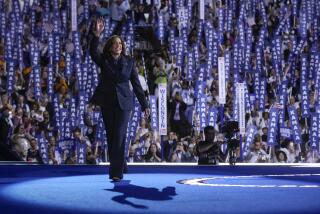One Nation, Under God, in the Times That Try Our Souls
- Share via
It took an unspeakable calamity to do it, but it was rather nice being one country again, wasn’t it? One country riveted by the same emotions and the same thoughts--heads and hearts united. Partisan politics nowhere to be seen. How long will that last?
One aspect of that shared experience slipped by with little notice, and that is exactly the point of today’s sermon.
The issue is the role of religion in public discourse.
Good ol’ religion, the dishrag of American politics--crumpled up, twisted, tossed around and treated with such disdain that it’s amazing it survives as long as it does.
Faith is supposed to be a beacon. But mix it with politics and watch that light flicker. Equal parts religion and politics becomes something not for soothing souls but for fanning flames.
Take abortion. Please.
Take prayer in schools. Pretty please.
Take TV evangelism that fronts for political power plays. Pretty please with sugar on top.
The pat answer, then, is to say religion belongs in churches, synagogues and mosques and not in legislatures and schoolhouses. That’s the side I take, but also would direct your attention to the events in the aftermath of the Oklahoma City bombing.
A brief setup: I talk occasionally with readers who are convinced the country is sliding into moral decay, that we are an increasingly godless society and that political figures and especially “liberal Democrats” are the villains.
On most days, I take that with a grain of salt. On cantankerous days, I argue back that religion hasn’t fled at all but that it should be reserved for those places of worship. Why pollute religion with politics, I argue, but then go on to say that Presidents Reagan, Bush and Clinton probably have made as many public religious utterances as did Washington, Adams and Jefferson.
The debate goes ‘round and ‘round, which is where all arguments about religion and politics go.
The question, I bleat, is where you draw the line between religion and public policy.
That line was drawn, it seems to me, over the weekend in Oklahoma City. Not only drawn but accepted by national consensus.
It’s hard to convince the Religious Right of this, but this isn’t a country that likes to discuss religion in public. And yet, there was no discernible outcry when President Clinton unabashedly invoked biblical references in his Sunday address.
*
That’s because in the context of the shared national mourning, leaning against a theological pillar sounded the right note. It was proper public discourse, connecting people across the country in a communal bond. Call it religion, call it faith, call it whatever you want--the country wanted to hear it and they seemed to want to hear it from its President as well as from its clergy. Indeed, even the most strident nonbeliever may have felt a momentary kinship with those depending on their faith for solace after the tragedy.
For those who proclaim Clinton an apostate, note the following: He talked about God. He referred to St. Paul and Psalms.
” . . . Though we share your grief, your pain is unimaginable and we know that,” the President said. “We cannot undo it. That is God’s work.
” . . . Let us teach our children that the God of comfort is also the God of righteousness. . . . As St. Paul admonished us, ‘Let us not be overcome by evil, but overcome evil with good.’ ”
It was, by any definition, religion in politics and in public. Not even the ACLU rose up to protest.
It was proper and timely and comforting to a country temporarily troubled and sorrowful.
That’s where religion belongs in American public life. It belonged there in Oklahoma City over the weekend because the power it conveyed transcended politics.
Take religion out of public life? No. Even if someone wanted to, they couldn’t. We might as well try to ban air from public life.
Correctly framed, the issue isn’t about eliminating religion; it’s about saving it for those places and occasions when it performs its best function--which is to soothe and unite, rather than to anger and divide.
For a while, President Clinton in Oklahoma City showed us how to do that. The tragedy let us be one country again. One country pondering what strength we can draw from faith in times of need, rather than pondering how many votes it can produce.
Dana Parsons’ column appears Wednesday, Friday and Sunday. Readers may reach Parsons by writing to him at The Times Orange County Edition, 1375 Sunflower Ave., Costa Mesa, CA 92626, or calling (714) 966-7821.
More to Read
Sign up for Essential California
The most important California stories and recommendations in your inbox every morning.
You may occasionally receive promotional content from the Los Angeles Times.










